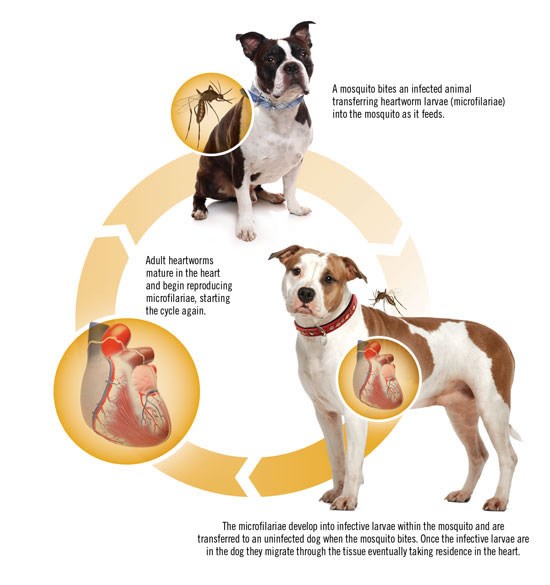Heartworm Prevention Guidelines For Dogs
02/21/2012 - Cardiology - General Practice & Preventative Medicine

GUIDELINES
Canine heartworm disease is a serious parasitic disease caused by a long, thin worm that lives in the blood vessels and heart of infected dogs. The disease is spread from dog to dog (and to cat) by mosquitoes. The mosquito bites a dog with heartworm infection, collects some of the microscopic heartworm offspring and then, after a couple of weeks,passes these on to another dog or cat.
Inside the dog, the microscopic heartworm can grow into a parasite exceeding a foot in length. The life cycle is somewhat complicated. The important thing is to prevent worm development using safe and effective preventative drugs.
Heartworms are present (endemic) in most parts of the United States and in many parts of North America. Mosquitoes are the key – without them the disease cannot spread. The highest rates of infections are found in subtropical climates like those of the southeastern United States, the Gulf states and Hawaii. However, heartworms are also found throughout the central and eastern United States, particularly near oceans, lakes and rivers. Heartworm disease injures the lungs, the arteries of the lungs and the heart. Symptoms include tiring, coughing, weight loss and heart failure. Heartworm infection in dogs is usually diagnosed by a blood test.
PREVENTION
Prevention of heartworm disease is simple. In most cases, a once-monthly prescription treatment is all that is needed to effectively protect your pet. These preventatives are only available from your veterinarian, who must first make certain that your dog is not heartworm positive. These"preventatives" kill microscopic larvae that are left behind by mosquitoes when they bite a dog.
Before beginning heartworm prevention, any dog over 7 months of age should first have a heartworm test. Preventatives in heartworm positive dogs can cause severe reactions. Repeated heartworm blood testing every year is recommended even for dogs taking heartworm preventative year round.Previous recommendations were for every 1 – 3 year testing but this changed with the 2005 American Heartworm Society (AHS) recommendations to yearly testing. This is due to concern with breaks of pets on preventatives that still contracted heartworms. Annual testing will ensure that an infection is caught in plenty of time to effectively manage it. Testing is also recommended when a pet owner switches between preventative medications.
RECOMMENDATIONS
The AHS recommends that all dogs in areas endemic for heartworms should take a year-round preventative. If you are not certain about the danger of heartworms in your area, call your veterinarian. Most veterinarians follow the guidelines published by the American Heartworm Society, a group of concerned veterinarians and scientists. As noted above, dogs over 7 months of age should first have a heartworm test. Speak to your veterinarian about administration guidelines.
Some heartworm preventatives also control intestinal or external parasites. The wide range of excellent and safe heartworm prescription products can be explained by your veterinarian.
For more information about the most recent recommendations on heartworm prevention, visit the guidelines posted on the Society's web site at www.heartwormsociety.org



